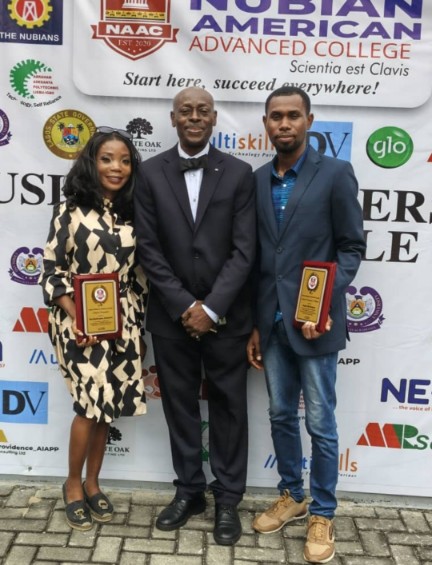The need to realign and restructure education curriculum came to the fore at the 2025 Business Leadership Roundtable organised by the Nubian American Advanced College Leadership (NAAC) in Lagos.
The roundtable discussion was attended by business leaders, stakeholders in the education industry and regulatory bodies that includes, Dr. Azhinoto Ozodion Ikpah, Chairman of Nubian Group and Chief Promoter of NAAC; Mr Adewale-Smatt Oyerinde, the Director General /Chief Executive of Nigeria Employers Consultative Association (NECA); Archbishop Doye Agama, the Founder of Digivertex Limited (UK); Professor Idris Bugaje, the Executive Secretary of National Board For Technical Education (NBTE) and the Lagos State Ministry of Tertiary Education, among others.
Dr. Ikpah, the Chairman/Chief Promoter of Nubian Group and Nubian American Advanced College, in his welcome remarks, opined that tertiary education training should be well tailored such that its products must meet the requirements and standards of the business entities/industry and the community/society.
To achieve this level of interdependence, Dr Ikpah posited that curriculums should reviewed and developed in such a way that they are relevant to the industries in the community which NAAC exists to provide.
“It is, therefore, fulfilling one of the purposes of our college to face headlong the challenge of graduate employability by asking the employers of the graduates why they do not consider them fit enough to be employed; to ascertain as a tertiary institution what gaps there are between the established and approved curriculums, the needs and demands of the industries that need their products, the graduates.”
“We equip students not just to earn certificates, diplomas, and degrees, but to create solutions. Through mentorship and hands-on experience, theory meets impact. Our hybrid model empowers flexibility without compromising quality. With pathways to top-rated globally focused colleges and universities, your education goes further. Diversity, integrity, and innovation are at the core of all we do.”
He advocated for collaboration among businesses and the tertiary institutions to face the realities of harmonizing the needs of businesses with the curriculums that produce the workforce for the businesses.
In his position paper, Mr Adewale-Smatt Oyerinde, the Director-General/Chief Executive of Nigeria Employers Consultative Association (NECA) said it has become uncomfortable for employers as universities and other levels of tertiary of education in the country continue to produce graduates that are ill-equipped for the demands of the modern workplace.
Acknowledging the place of tertiary education as an effective tool for human capital, the NECA boss emphasised that the employability gap challenge in Nigeria is not one of certification, but of competence, particularly their lack of relevant skills for the modern workplace.
He identified the root causes to include Outdated and rigid curricula, saying, “Many higher institutions in Nigeria still operate with curricula that do not evolve with changing industry needs.”
This disconnect, he argued, leads to graduates who are academically qualified but lack the practical, industry relevant skills required in today’s job market with far-reaching.implications.
He identified the gaps to include deficits in soft skills such as poor Communication, emotional intelligence, teamwork and collaboration.
He added, “For instance, a study in the Nigerian banking sector revealed a growing need for emotional intelligence training among employees. Employers frequently report that even top-performing graduates struggle to write effective emails, reports, or presentations without external help including artificial intelligence tools.
According to him, other challenges are Digital Illiteracy, Lack of work-based learning opportunities, and brain-drain, among others.
Acknowledging Nubian American Advanced College for the strides, he said NECA recognizes the important of leveraging Transnational Education (TNE) as it enhances employability, innovation, and bridge educational gaps in high-demand areas such as education and address critical skills gaps in the labour standards without the high cost of overseas education, reduce youth unemployment and reverse the brain drain development while strengthening Nigeria’s human capital.
Archbishop Doye Agama (Rtd), the Founder of Digivertex Limited , UK in a paper titled “Bridging the Digital Divide:
Embedding Affordable Digital Skills in Nigeria’s Tertiary Education”, lamented that data showed that Nigerian graduates apply for 200 jobs, receive 3 interviews, 85% of Nigerian graduates lack digital skills, 92% of jobs require digital skills today and 75% of jobs will require advanced digital skills by 2030, saying through a global challenge that requires a great urgency.
Applauding NAAC’s leadership role in providing solutions through partnerships with the Federal Ministry of Education, NBTE accreditation, U.S. university partnerships, Corporate training partnerships with Industrial Training Fund
and campuses in Lagos and Port Harcourt, he advocated that solution lies in integration across all disciplines.
In a goodwill message, Adeniran Kasali, Permanent Secretary in the Ministry of Tertiary Education, said the the roundtable was timely as it coincided with the state’s ongoing drive to reposition tertiary institutions to meet the critical challenge of producing graduates with the skills and knowledge needed not just to fill roles domestically but also to compete globally for jobs.
Kasali, represented by Yakub Olayemi, emphasised that to achieve global competitiveness is has become imperative to update the nation’s higher education curriculum.
He added,”This means introducing modern tools, recruiting qualified staff, providing training in digital and artificial intelligence, fostering cooperation and knowledge-sharing among our institutions, and conducting regular research on both relevant local and international topics morning everyone, and all protocols have been duly observed.
He said this calls for introduction of modern tools, recruiting qualified staff, providing training in digital and artificial intelligence, fostering cooperation and knowledge-sharing among our institutions, and conducting regular research on both relevant local and international topics.
He emphasised the need for adequate funding and further collaboration with international institutions that could culminate in the exposure of students to global standards through exchange programmes are crucial steps.














